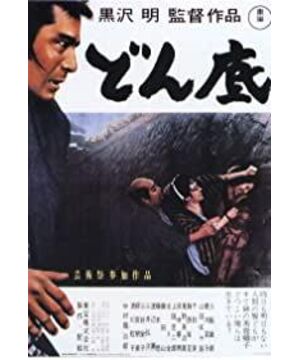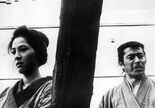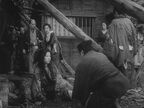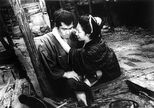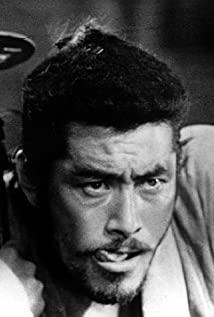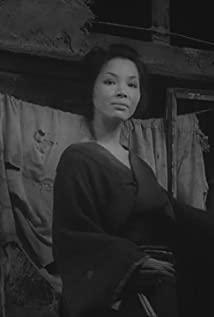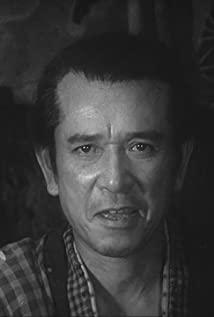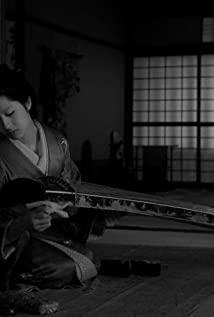"Lower Floor" and "Little Ruins Without Seasons" are two films in Akira Kurosawa's film chronology that are often overlooked or undervalued. Different from his aggressive samurai films, and different from his films of hope and passion. The melancholy and tragic emotions transmitted by these two films can easily lead to a kind of bewilderment and confusion. Therefore, many people think that these two films are not like Kurosawa's films, "Lower" has so many words, ramble, and boring; "Xiaoxu without seasons" is so monotonous and depressing. However, in my opinion, these two films are still typical Kurosawa Akira films. The application of deep focus technology gives the film an unusual sense of hierarchy, and the deep and full character depiction is more in line with Kurosawa Akira's previous films. . In terms of content, the theme expressed in the film is actually one of the focuses of Akira Kurosawa all along. The themes of human nature, morality and human survival can be seen as the commonality of almost all of Kurosawa Akira's films, and "Lower Floor" and "Small Ruins Without Seasons" are no exception. Akira Kurosawa has always been committed to creating different environments to express his humanitarian concerns, such as troubled times, such as death. These two films turn the lens to the bottom of the society living in poverty and poverty. In the most difficult life, human nature is exposed. Inexhaustible, selfish, greedy, lazy, day after day, year after year, in the tragic reality, dreaming unrealistic dreams, and hope is still far away.
"Lower Floor" and "Spider Nest City" were also completed in 1957, and both were adapted from foreign famous novels. This film based on Gorky's novels seems to be closer to life. Transplanting Russia in 1902 to the Edo period in Japan, Akira Kurosawa was extremely successful in finding the similarities between Japanese and Russian cultures, realizing the localization of the film, not only the characters and costumes. The dialogue and music are also very local and characteristic of the times. It depicts a group of people at the bottom of society in a slum vividly, and uses a comical comedy to express the tragic life of this group of people, which is full of tension and thought-provoking. "Small Ruins Without Seasons" is Akira Kurosawa's first color film. It describes the desperate living conditions of a group of people around a garbage dump. The film looks relatively gray. Come on, a kind of pessimistic and depressed mood runs through the whole film. This may be the mood of Akira Kurosawa at that time. Shortly after the film was finished, Akira Kurosawa committed suicide by cutting his wrists. Fortunately, he attempted suicide, so that we can see him More classic works appear. "Small Ruins Without Seasons" was a commercial failure at that time, and was considered a failure in art, but from today's point of view, this film has a different kind of charm. Ze Ming fully shows his extraordinary talent. Under the surreal setting and colors, in the simple and tranquil scene, all kinds of poor little people around the shantytown are on the paper, and the film reflects the value of human existence. Thoughtful, vivid and vivid.
The sadness of reality
People at the bottom of society have the most difficult and difficult lives, which is the so-called poverty and whiteness. This is a state of tragic growth. Poverty strikes, and everyone cannot escape. The dilapidated rental house in "Lower Class" is the best portrayal, without any furnishings, worn out quilts, Messy straw, crumbling doors, a group of ragged little people: thieves, prostitutes, coachmen, craftsmen, and opera singers... Survival is their primary need, or their only goal, working all day, but after all, they can't even pay the rent rise. As the two women who dumped garbage on the roofs of the poor people at the beginning of the film said, "It's a garbage dump anyway." The people in this house are a group of garbage abandoned by society. They drink, gamble, and steal. The gambler who often made a lot of money in gambling said: "As long as it can improve my life, I will do anything." This is their voice. Akira Kurosawa meticulously sketched a different picture, which is thought-provoking. "Small Ruins Without Seasons" vividly describes the living conditions of a group of poor people. It is monotonous and repetitive. As in the Chinese translation of the film, the people here seem to have lost their sense of the seasons and are looking for the small taste of life in difficult times. Women who often gather around the tap to make irresponsible remarks, middle-aged men struggling in the shadow of his wife's infidelity, workers who are often drunk, mentally handicapped boys who think they are tram drivers, girls who work around the clock... This inner island The husband's family vividly interprets the helplessness of a hard life, the bitterness of getting the bottom of the pot and cheating rice in the rice shop, and the scoundrel who cares about buying broccoli, all of which are actually poverty.
The real grief doesn't stop there. Disease and poverty follow like shadows. The blacksmith's bedridden wife in "Lower Class" moans and speaks in grief. Chilled. Including the blacksmith, they turned a blind eye to his wife's illness, and were even deeply disgusted. When they received the news of her death, people's first reaction was, "Finally, you don't have to hear that annoying cough anymore." However, we can't blame this group of people for their insensitivity, as the old dad in the film said: "We don't have time to pity ourselves." They are powerless to the pain of others, and in society, they are all weak. "Little Ruins Without Seasons" cruelly let the little beggar who represents the hope of the next generation die, leaving his father in pain and despair. When the little beggar ate unclean food by mistake, got dysentery and was struggling to the brink of death, his father But there was nothing he could do, he could only sit and watch his son die step by step, grief-stricken. For this group of people, life at the bottom is tantamount to hell on earth.
2. Fantasy and Disillusionment
For poor people, fantasy is a good medicine to ease their inner pain. In the days of material poverty, seeking a rare spiritual comfort has become the reason for their continued existence. In the face of reality, they use lies and alcohol to numb themselves, nostalgic about the illusory past, look forward to the absurd future, or force themselves to think about nothing, deceive themselves to find the funny little taste in life, and pretend to face the reality. The old man's song in "Lower Floors" is said to turn into thunderous applause, which just shows what these people want: "In the hazy moonlight and spring mist, three percent drunk and welcome the cool wind, returning birds to their nests by the river, I have no intention of picking up a hundred taels of silver, tonight is the eve of the beginning of spring, where the night eagles fly by the river, I don’t know who left the wallet, spring brings good luck.”
When the poor prostitute weaves the absurd love with her clients with lies and tears, it looks like a laugh, but it actually contains unspeakable sadness, as Dad said: "Think about why she said these words ." Kadai pointed out sharply, "I have also thought about many things, and I hope that one day it will come true." The coachman, who claims to have a samurai background, flaunting his lavish past life also seems to be the reason for his self-esteem and hope. The blacksmith desperately wanted to draw a line from the other people in the house. He thought he was skilled, and hurriedly repaired the bottom of the pot all day long, claiming that he would leave here even if he was crawling. At least that kept him alive.
Xiaoliu, an imbecile in "A Small Market Without Seasons", can be said to be the ultimate fantasy. He imitates the sound of trams with hope every day, shuttles back and forth to the small market, and the wind and rain do not change. But the beggar father and son, who are struggling in life, are looking forward to the future by fantasizing about building a luxurious house for themselves. From the location of the house to the choice of doors, to the walls, the color of the house, the swimming pool, etc., in the midst of hunger and disease Under this state, I fantasize about a wonderful house feebly and meticulously, and bitterness comes out spontaneously. The two workers, who were disheveled and smeared every day, showed their absurd behavior in a state of poverty on the other hand, drinking heavily all day and forgetting their daily work under the influence of alcohol. In the monotonous life, they made such absurd behavior of exchanging husband and wife, but this can only be attributed to the scourge of poverty. In the cycle of life, they may just want to seek a little change.
However, it has been proved that all the efforts of these people are in vain, and fantasy cannot make them forget the reality after all. There is nothing left to do; the blacksmith, who claims to be different from the others, is still unable to leave after the death of his wife, and becomes even more impoverished. "Little Ruins Without Seasons" made the little beggar who symbolized hope die, and everything was even more dazed. Akira Kurosawa gave the mentally handicapped Liu Liu, a mentally handicapped child who didn't understand the sufferings of the world, the greatest hope, and accompanied it with lively music when it appeared. , it seems more like a kind of irony, the mourners continue to mourning, the bored remains bored, just like the two workers who exchange husband and wife, it seems that life is still monotonous. The blacksmith in "Lower Levels" hysterically shouted: "The truth? What is the truth? I am the truth. I have no money, no job, just waiting to die. This is the truth. Whether I lie or the truth, everything is unbearable!" And In the back of "Small Ruins Without Seasons", when the wife, whose infidelity caused her husband to suffer for a lifetime, walked out of the small ruins, she muttered to herself, "It is no longer a tree when it is dry." In the same way, people who have lost everything are still called people? Fantasy that does not belong to oneself can never get rid of the fate of disillusionment, and this can only make real life more sad. ,
Three, Faith and Fate
When the thief Sheji asked his father in confusion: "Is there really a Bodhisattva in this world?" The father smiled awkwardly: "Believe, there is." This just exposed the nihility and absurdity of belief. The subtext of "belief is there" is "Believe or not". It is questionable, then, how much faith can do for the poor. The greedy landlord expressed the incompatibility between belief and reality more realistically. When the old man asked, "There is good reward? When will it be rewarded?" The landlord replied, "After death," he continued, " Kindness goes to kindness, money goes to money, don't mix it up!" This is the portrayal of reality, people's sorrows will not be reduced by kindness, and people's dreams will not come true because of kindness. In Japan, a country deeply influenced by Buddhist culture, there is a lot of irony in it. Whether it's the blacksmith's wife who asks whether there really is Huangquan in the midst of illness in "Lower Level", whether there is no more pain on the road to Huangquan, or Tsugaru praying for her hand that is about to be sawed off, or the "Small Ruins Without Seasons" that A devoutly praying mother, the brilliance of the Buddha has never been seen, the grief remains, and the tragedy remains. When the actor in "Lower Levels" who was about to quit drinking and become a new person hanged himself, his beliefs were once again emptied, and he couldn't find the temple in his heart that gave people free abstinence.
There is a respectable wise man in "Lower Floor" and "Small Ruins Without Seasons". They look at these suffering people with compassion and do everything they can to help them find a basis for survival, but their limitations are also Extremely obvious. In fact, they are not above all else, they are also a member of this group of miserable people, and when they use beautiful and white lies to give people hope, they also make people more difficult. After all, the old man in "Lower Level" can't change anyone's fate, and he ran away in a hurry when the tragedy came. Mr. Danbo in "Small Ruins Without Seasons" successfully made the drunk man put down the butcher's knife, and once voluntarily handed over the money to the thief, rekindling the desire for life in the person seeking death, but he was ultimately powerless against the tragedy of the world , the thief still steals, until he is arrested, the little beggar struggles in pain, he can only be a powerless bystander. All this comes from the fact that they are also lowly and pitiful characters, how absurd and ridiculous it is for them to take the responsibility of changing people.
At the end of "Lower Levels", the protagonists are either imprisoned, dead or missing, and those who remain still can't find a way out. The father's departure and the old man's suicide have shattered their hopes at one time. They can only continue to live by anesthetizing themselves. When the people in the film sing and dance to express their helplessness and sadness, a deep sadness fills their hearts. In "Little Ruins Without Seasons", Akira Kurosawa sarcastically gave the mentally handicapped Xiao Liu the greatest hope and happiness, or, in the sad and hopeless bottom life, only people who are inexperienced have it. They are pure joy. Others, even as young as the poor illegitimate sons of craftsmen, live in the ridicule of people and burst into tears. The film's warm and happy soundtrack seems hardly hopeful or warm. Maybe the life at the bottom should be like the man who was struggling in the shadow of his wife's infidelity, without happiness, and lived a miserable life like a walking corpse.
View more about The Lower Depths reviews


